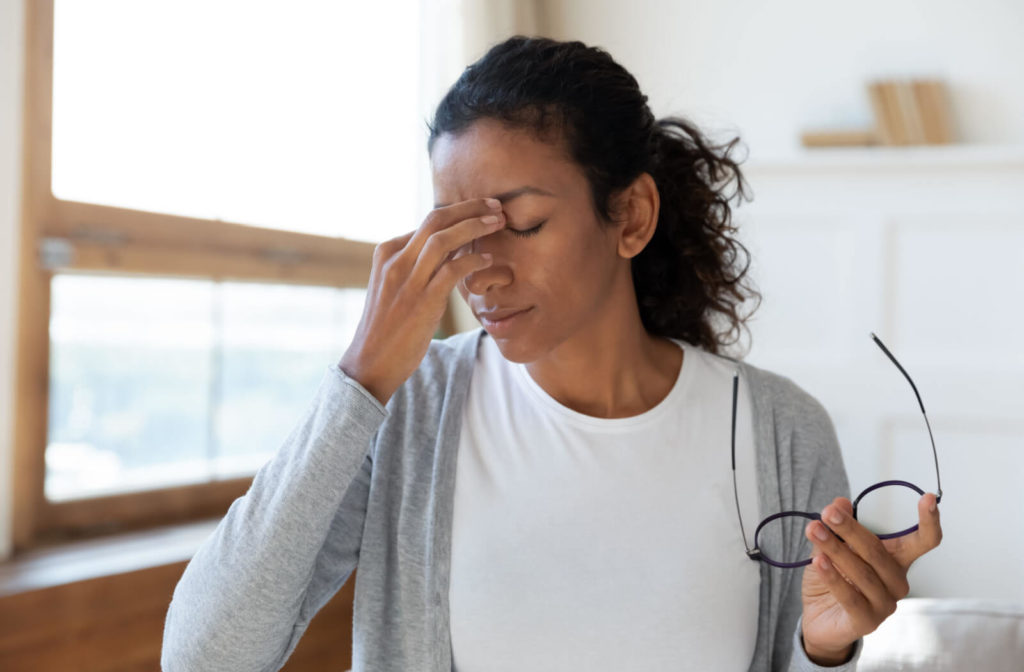Dry eye syndrome, also known simply as dry eye, is a prevalent condition that affects many people. There is no single treatment option because several things can cause dry eye, which we’ll look at in this article.
You don’t necessarily need an examination to diagnose dry eye. However, suppose over-the-counter (OTC) eye drops don’t offer your red, itchy eyes relief. In that case, it’s a good idea to see an optometrist. During a comprehensive eye examination, the eye doctor can determine if any underlying causes are aggravating your dry eye symptoms.
What Is Dry Eye?
The eye produces tears to stay lubricated and protect itself from contaminants. These are a mixture of several things, including water, oils, and proteins. Suppose the eye produces low-quality tears that evaporate too quickly or not enough in the first place. In that case, the result is often dry eye syndrome.
Even if someone doesn’t have chronically dry eyes, they can sometimes experience certain dry eye symptoms. For example, if you’re somewhere with an arid climate, the wind is blowing in your face, or you’re staring at a computer screen for long periods, you may experience the uncomfortable symptoms of dry eye.
Symptoms of Dry Eye
Some of the common symptoms of dry eye include:
- Light sensitivity
- Redness
- An itchy or scratchy feeling
- Feeling like there is something in your eye
- Excessive eye watering as your body overcompensates for the dryness
- Blurred vision
- Eye strain or fatigue
- Mucus discharge
Causes of Dry Eye
There is no single cause for dry eye. In most cases, it’s easy to treat the condition’s symptoms. However, it can be more complicated, depending on the cause.
Tear Evaporation
If your dry eyes are caused by an increase in tear evaporation, there’s a handful of things that could be causing them:
- Environmental factors like wind or smoke
- Vitamin deficiency, specifically vitamin A
- Long-term use of eye drops with preservatives in them
- Eyelid issues like ectropion or entropion
- Not blinking as often as you should
- Meibomian gland dysfunction (MGD)
What Happens if You Don’t Treat Dry Eyes?
Not much treatment is required for minor dry eye symptoms that result from things like windy or smokey conditions or digital screens. A high-quality OTC eye drop is often enough to manage the symptoms without trouble.
However, additional treatments may be necessary if the dry eye symptoms are more pronounced and ongoing.
If severe dry eye syndrome is left untreated, there are a few significant complications that could come of it:
- Eye damage: Without the proper lubrication, the surface of your eye can sustain damage. This is especially the case if you’re in an environment that introduces microscopic contaminants like dust to your eye.
- Infection: One thing that the tears do is protect the eye from germs. So, without enough tears, your eyes may be open to infection.
- Excessive discomfort: While discomfort may not damage your eye by itself. It can severely impact your quality of life. Severe dry eyes will often cause discomfort and subtle vision problems like blurry sight.
Dry Eye Treatment
Typically, dry eye treatment is focused on the symptoms. After they examine your eyes, your eye doctor can recommend the best treatment based on what’s causing your symptoms.
Here are a couple of common treatments to alleviate dry eye symptoms:
- Eyedrops, prescription or OTC
- Medication to reduce inflammation in your eye or eyelid
- Special insert that slowly dissolves and offers you extra lubrication
- A warm compress or special warming mask that loosens the oil in your meibomian glands to help improve the flow.
In more severe cases, these are some options your optometrist may suggest:
- Restasis drops that encourage proper tear production in your eye
- Scleral lenses that sit on the eye’s sclera and bridge the cornea. This creates a pocket of fluid to help keep your eye lubricated
- Intense pulsed light therapy, known as IPL therapy, coupled with an eyelid massage.
Preventing Dry Eye
If you’re at an increased risk for dry eye for any reason, there are some things you can do to help prevent or minimize the effects of the condition:
- Running a humidifier is helpful, especially in the winter when the air is dry
- Avoid having air from the wind or a fan blow directly in your face
- Wear sunglasses or glasses that wrap around to prevent airflow on your eyes
- If you spend a lot of time on the computer, set the screen lower than eye level, so your eyes don’t have to be as wide
- Avoid getting smoke in your eyes
- Use eye drops specifically formulated to hydrate and lubricate your eyes
Are You Struggling With Dry Eyes?
Whether you’re dealing with seasonal allergies that cause dry eye symptoms or your eyes are always dry, you don’t have to suffer needlessly. There are several ways to bring immediate and potentially permanent relief! Give us a shout at Metro Eyecare. Our professional staff is happy to answer all your questions and book you a convenient appointment to discuss your options with the optometrist.


